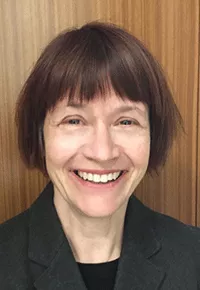Film & Media Studies Professor Patricia White on Women's Filmmaking

Los Angeles Review of Books: Gender Matters at the Toronto International Film Festival
This summer, Warner Bros.’s Wonder Woman handily tied up the distinction of highest-grossing domestic release. With a female superhero headlining, and the highest budget ever entrusted to a woman director, the movie’s front and back ends shared the gender equity spotlight. Writer-director Angela Robinson’s indie film, Professor Marston and the Wonder Women, which premiered at the Toronto International Film Festival (TIFF) in September and opens October 13, shifts the focus away from spectacle to the cultural workers who created the icon, taking a more nuanced approach to questions of gender, power, and what it means to direct a scene. This year’s edition of the festival did the same, lending both glitz and heft to an important transnational conversation about women’s filmmaking.
Each year, Martha M. Lauzen’s report “The Celluloid Ceiling” tells a familiar story: in 2016 women directed only seven percent of top grossing films in North America (“domestic” box office statistics fold in Canada). But from a global perspective, top grossing Hollywood feature films are hardly an appropriate control group for assessing the achievements of women filmmakers.
At TIFF, where less profit-driven modes of production are featured — art cinema, documentary, independent cinema, and even premium television — a full 33 percent of 340 films this year were directed by women. This includes established filmmakers getting their due in the prestige economy. Eighty-nine-year-old Agnès Varda won the audience award for documentary for Faces Places, her near-magical collaboration with street artist JR. Hungarian Ildikó Enyedi returned after nearly 20 years with Berlin Golden Bear–winning On Body and Soul, a surreal love story set in a slaughterhouse. Films by young directors in the Discovery section included Jenna Bass’s High Fantasy, shot on an iPhone, in which a multiracial group of young South Africans switch bodies for a day; Waru, a ground-breaking omnibus film by eight Maori women, several of them first time filmmakers; The Swan, an adaptation of a realist novel about a young Icelandic girl sent to the countryside; and Village Rockstars, the story of a village girl in northeast India who dreams of playing in a band and cuts a guitar out of Styrofoam. Filmmaker Rima Das, who wrote, shot, directed, edited, and produced the film herself, has the same DIY spirit.
Patricia White is a scholar of feminist film and Eugene Lang Research Professor of Film and Media Studies at Swarthmore College. Her book Women’s Cinema/World Cinema: Projecting Contemporary Feminisms has recently been published by Duke University Press. She is also the author of Uninvited: Classical Hollywood Cinema and Lesbian Representability and her work has been published in Camera Obscura, Cinema Journal, GLQ, Screen and in the edited collections Inside/Out and A Feminist Reader in Early Cinema, among others. She received her Ph.D. in the History of Consciousness from the University of California, Santa Cruz, where she worked with Teresa de Lauretis, and she is editor of de Lauretis’ Figures of Resistance: Essays in Feminist Theory. She is co-author with Timothy Corrigan of the widely adopted introductory film textbook The Film Experience and co-editor with Corrigan and Meta Mazaj of Critical Visions in Film Theory. She serves on the board of the non-profit feminist media arts organization Women Make Movies and the editorial collective of the feminist film journal Camera Obscura. She is an advisory editor of Film Quarterly.



